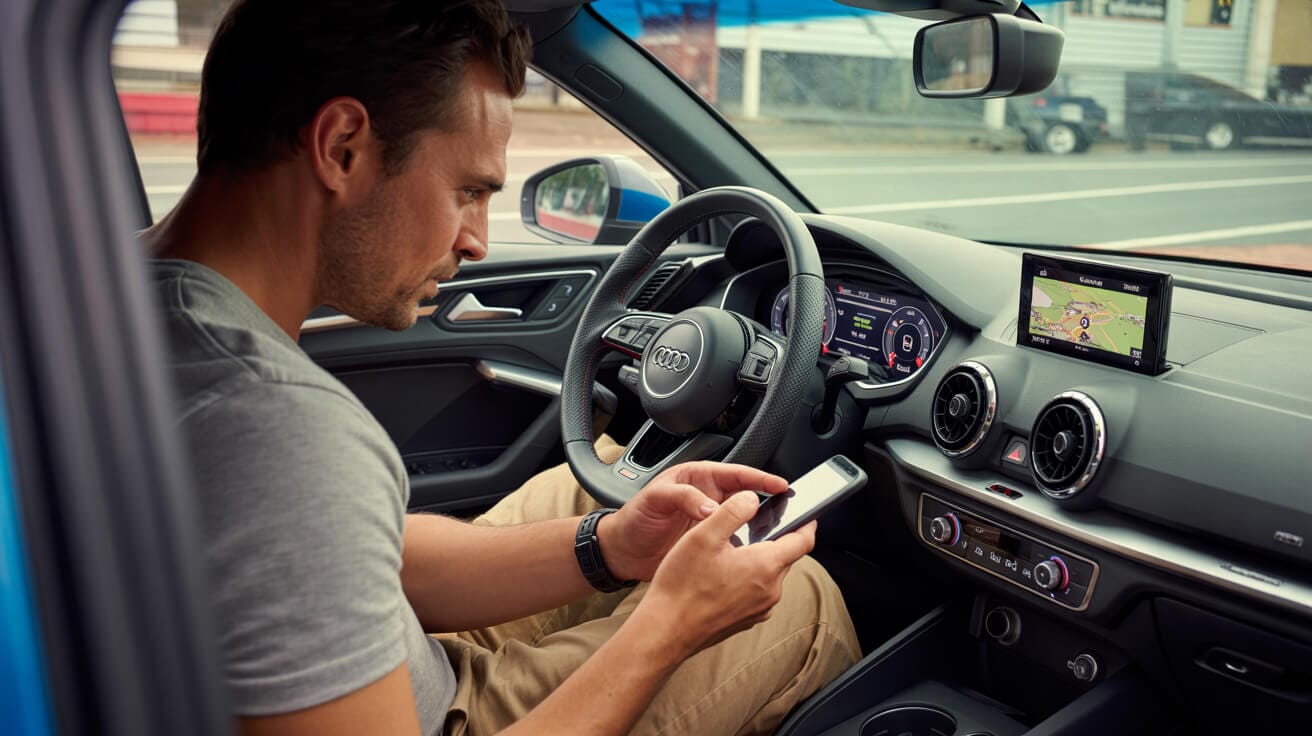What is a smart key for cars in the UK and how does it work?
A smart key lets you unlock and start your car without taking a key out of your pocket, using encrypted radio signals to communicate with your vehicle the moment you’re close. It’s not just a modern convenience—it’s the new baseline for car security and comfort for drivers across the UK.
Instead of fiddling with a metal blade, you simply walk up to your car, the key fob in your pocket or bag. Your car’s sensors detect the presence of the correct key, and with a simple touch or press, your doors unlock or the engine comes to life. This is more than just a trick—every step is shielded by secure electronics designed to prevent copying or interference.
What technology powers a car smart key in the UK?
Smart keys speak to your car in two frequencies. For short-range access, they use low-frequency signals (125kHz) to confirm the fob is next to the car. For greater reach, like pressing a button across a car park, ultra-high-frequency signals (433MHz) come into play. Every time you unlock or start your car, both your fob and the car exchange a coded signal—unique every use, constantly shifting—making cloning or replay attacks practically impossible.
What matters most: only the right, recognised signal ever unlocks or starts your car. Your data and your ride stay safe.
Why are smart keys now a UK standard?
Car buyers want simplicity and speed. Smart keys offer hands-free entry, push-button start, and even adjustments for seat or mirror positions—features UK buyers now take for granted. Add mobile apps for digital keys to this mix, and the traditional metal key is fading fast.
There’s a tangible difference in the way you approach daily journeys when your car recognises you before you touch the handle.
How does a keyless entry system operate on UK cars?
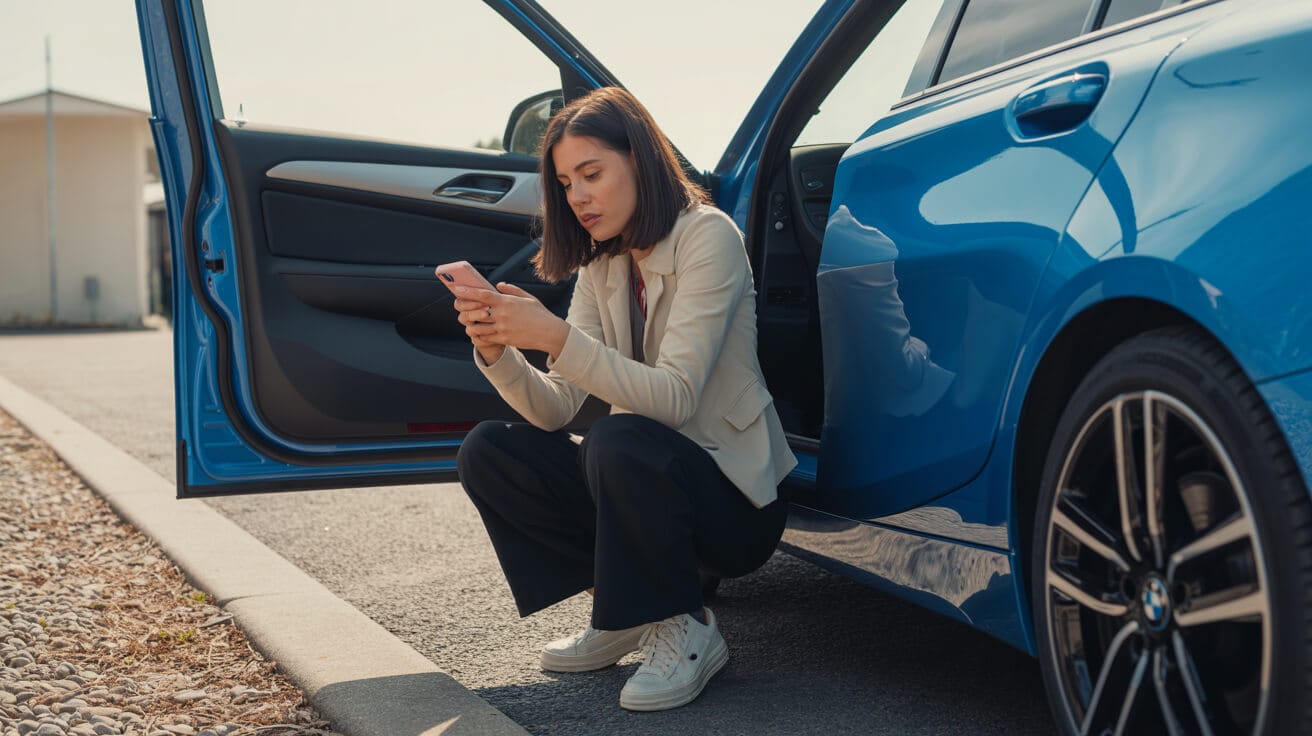
A keyless entry system automatically senses when your smart key is nearby, making access frictionless—you put your hand on the handle, the car checks for the fob, and unlocks instantly. When you’re inside, a backup security handshake confirms you’re authorised before the engine starts.
Here’s the pattern: car sensors broadcast a request, your key responds with a one-time code, and the car unlocks if everything matches. Start the car, and a similar two-way check secures the process.
What are the keyless entry system types used in the UK?
You’ll encounter three: remote keyless entry (press a button to unlock), passive keyless entry (walk up, it unlocks by itself), and digital keys (control access using your phone or watch). High-end cars blend all three, but even mainstream models now offer some form of keyless system.
- Remote keyless: Push-button unlock/lock up to several metres away.
- Passive keyless: As soon as the key approaches, access is granted seamlessly.
- Digital/App-based: Advanced cars now use Bluetooth, NFC, or even UWB radio to make your phone or devices into car keys.
Every system has a foundation in robust hardware and dynamic, manufacturer-grade encryption.
How is keyless entry tied to vehicle security?
Your keyless entry is more than an unlock button. It’s linked to your car’s immobiliser (anti-theft) system: unless the right key or device signals, the vehicle simply won’t start. Some manufacturers include guest modes, access logs, and advanced protection to support lending and sharing.
Today’s vehicle security doesn’t stop at the lock—it’s about layered digital authorisation throughout your car.
Are keyless entry cars easier to steal in the UK, and how can you make yours secure?
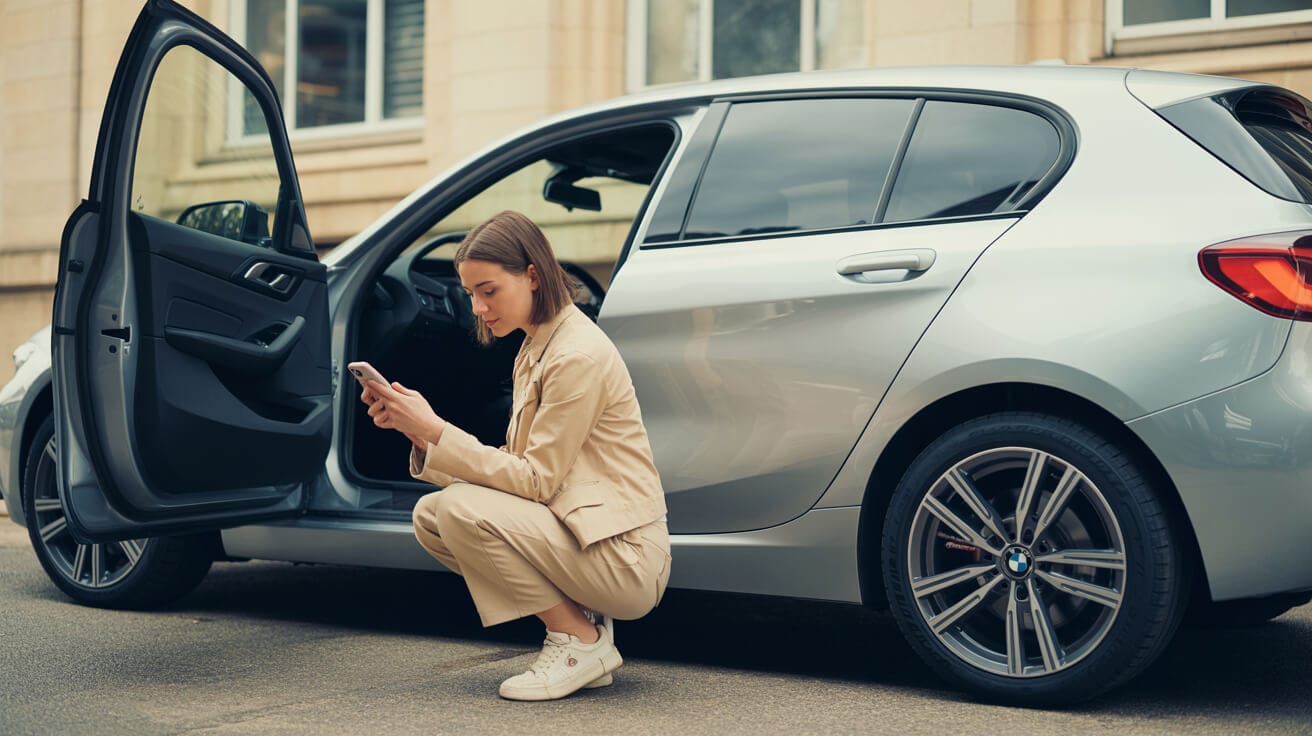
Keyless cars are targeted by relay attacks, where thieves boost your fob’s signal to trick your car into unlocking. But security comes down to how you use and protect your keys. Many new systems feature enhanced encryption and motion sensors to thwart these methods, and simple owner habits add an extra layer.
Relay theft isn’t inevitable, nor is cloning common. Most problems occur when the fob sits close to doors or windows, making it easy for thieves to amplify signals.
What theft risks do keyless systems present?
- Relay attacks: —fob signals relayed to unlock the car when you’re nowhere nearby.
- Jamming: —criminals block your car’s lock signal so you walk away and the car stays open.
- Cloning: —less likely, as rolling codes make copying nearly impossible.
For the majority of drivers, secure routines and updated tech keep risks at bay. Most insurance providers now expect certain security habits.
How can you secure your car’s keyless entry?
- Store your fob in a Faraday (signal-blocking) pouch at home and work.
- Position keys away from doors, windows, and outside walls.
- Replace fob batteries promptly—low power can weaken security features.
- Check for manufacturer software updates or security bulletins.
- Work with trusted, certified locksmiths for extra security options.
Staying ahead of thieves is about simple, repeatable choices combined with technology.
True security is the sum of persistent habits layered over strong systems.
What does it cost to replace or programme a smart key or keyless fob in the UK?
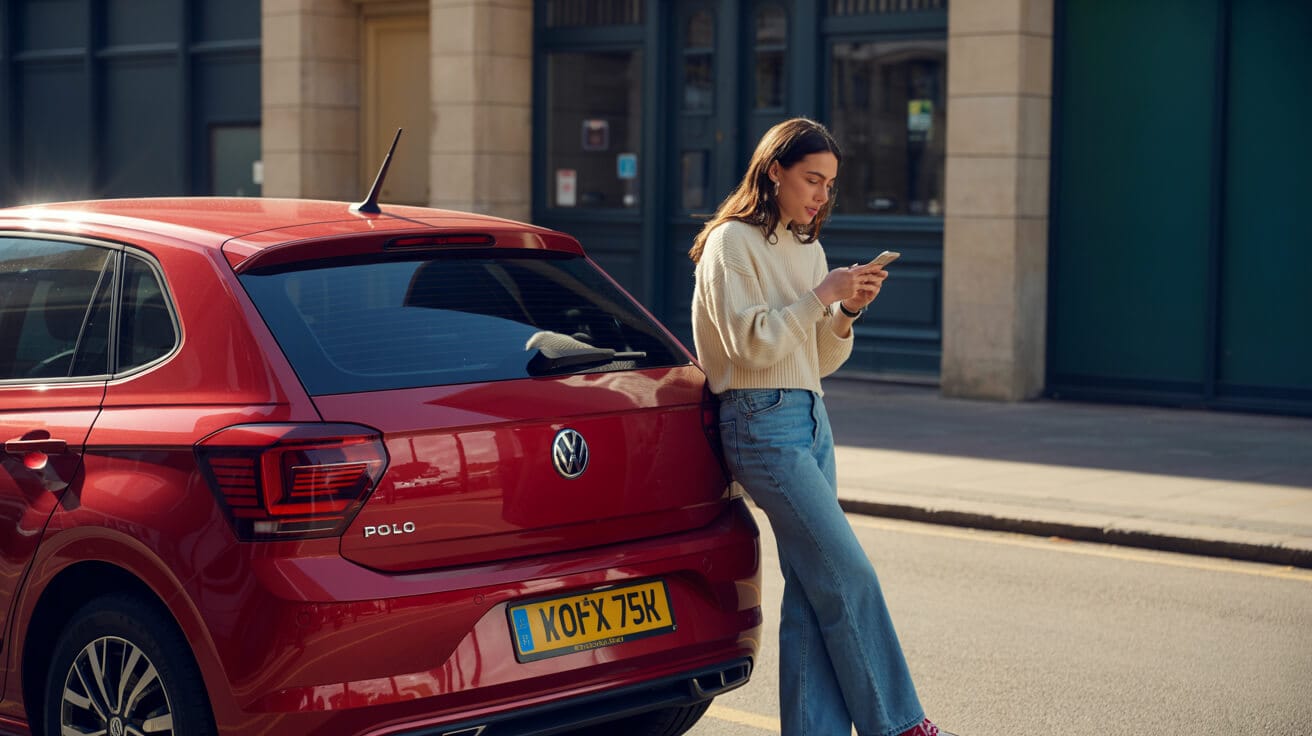
Replacement or programming in the UK varies—£120–£180 is typical for standard makes, but digital keys or premium marques can climb to £200–£400 or more. Prices stack up from the fob itself, diagnostic programming, emergency/remote callout, and aftercare.
Long gone are the days of cheap metal blanks. Today’s fobs pack encrypted microchips and demand specialist coding.
What affects smart key replacement prices in the UK?
- Your vehicle make/model/year: —latest or prestige models command more.
- Key type: standard fob, smart (proximity), digital (app-based) all have different price bands.
- Programming complexity: syncing to immobiliser/security modules takes certified skill.
- Timing/location: emergency or out-of-hours jobs usually cost extra.
- All-keys-lost cases: stricter ID requirements and possibly ECU/module resets.
Autolocks Ltd lays out every cost upfront—no hidden extras or surprises. Every replacement includes full programming, handover, and real-world demo.
Why choose an auto locksmith over a dealer for smart keys?
Auto locksmiths outpace dealers for value, speed, and convenience. Most can cut and code your key at roadside or home, bypassing main dealer wait times. Only brand-new “app key only” vehicles might force a main-dealer route, due to software lockdowns.
An upfront price for supply, programming, demo, and warranty is your strongest safety net in a stressful moment.
Can a UK auto locksmith replace or programme a smart key, or must you go to a main dealer?
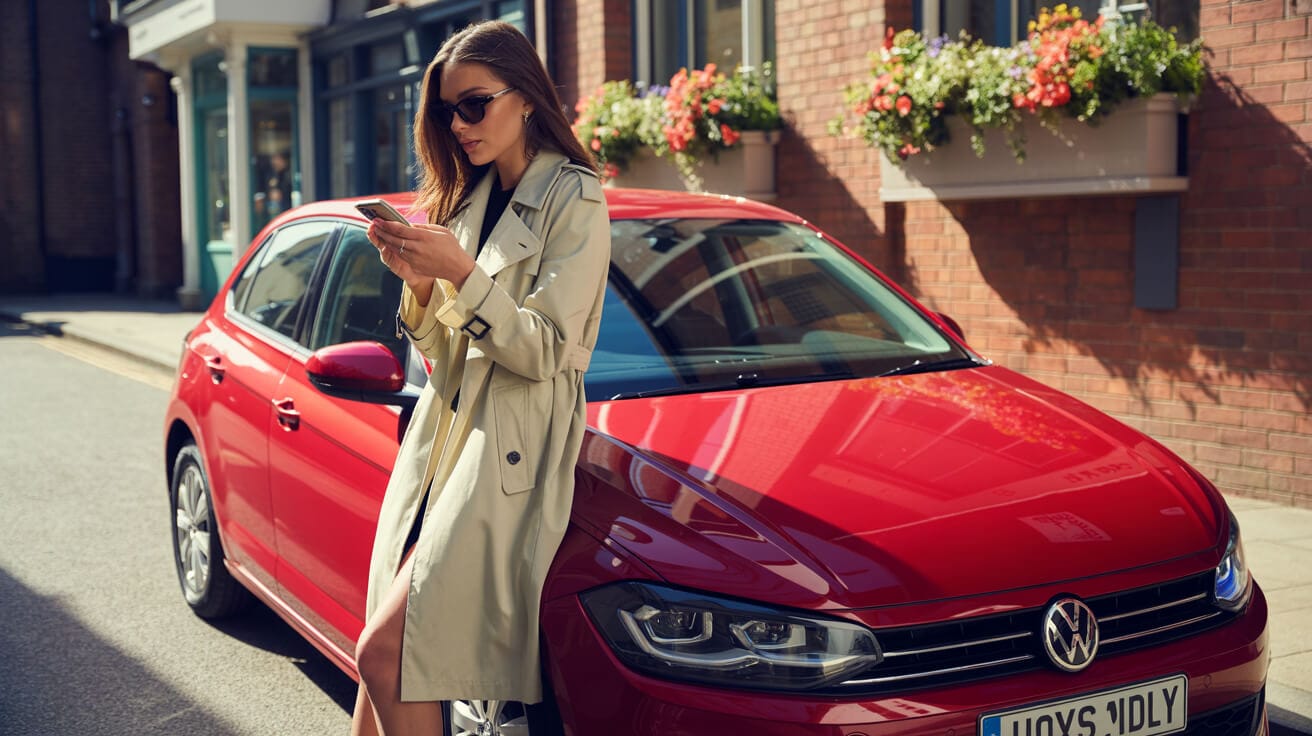
For the lion’s share of UK cars, a certified auto locksmith can replace and programme your smart key—faster and usually more affordably than dealerships. Dealers tend to be essential only for the very latest digital keys and certain insurance/warranty constraints.
Locksmiths like Autolocks Ltd use approved tools, run full ID and ownership checks, log every programming action, and give audit-ready handover. That’s essential whether you drive a Ford, VW, Nissan, BMW, Mercedes, Toyota, Peugeot, Renault, or more.
What is the locksmith’s process for smart key replacement?
Smart key/fob replacement in five steps:
- Confirm owner ID and vehicle details, meeting compliance.
- Decode your car’s key profile, cut a new blade if needed.
- Securely programme the new key/fob into your car’s immobiliser and security system.
- Test unlocking, starting, and alarm—then demo the result.
- Deliver documented proof and aftercare advice.
Autolocks Ltd achieves fast first-time fixes, both urgent and planned—a sign of real expertise.
When is it dealer-only for UK smart key systems?
- Latest app-only key systems (BMW, Mercedes, some VW, Tesla).
- New car warranties mandating dealer-only programming.
- Models with security software that blocks external access.
If you lose your only key, a responsive locksmith is your speediest, safest option. But always ask about warranty and policy before you authorise work.
Are smart key and keyless entry systems covered by UK car insurance and regulations?

Smart keys are part of your comprehensive car insurance, but terms vary. You may need to prove responsible fob storage or use of signal-blocking devices. If your car is stolen and keys are left unprotected, claims could become slippery.
By law, electronic keys are integral to a car’s anti-theft systems—the way you treat and maintain them matters for both coverage and compliance.
What’s required under UK law or for insurance with smart keys?
- All keys/immobilisers must comply: with anti-theft and radio standards (EMC, security, ISO/SAE 21434).
- Apps or digital keys: —your data and credentials must be protected under UK/EU privacy law (GDPR).
- Supply and programming: —authorised personnel using compliant tools, traceable records, and customer consent are all non-negotiable.
Meet these, and your insurance and warranty stay strong.
Will a third-party locksmith affect your car insurance or warranty?
If work is done with correct programming and records—diagnostic logs, photos, proof of compliance—then your insurance and often your warranty remain protected. For brand-new digital keys, main dealer service is safer for policy validity.
Trust, audit, and documentation protect more than you realise: your car, your peace of mind, and your cover.
What maintenance and care do smart keys and fobs require?
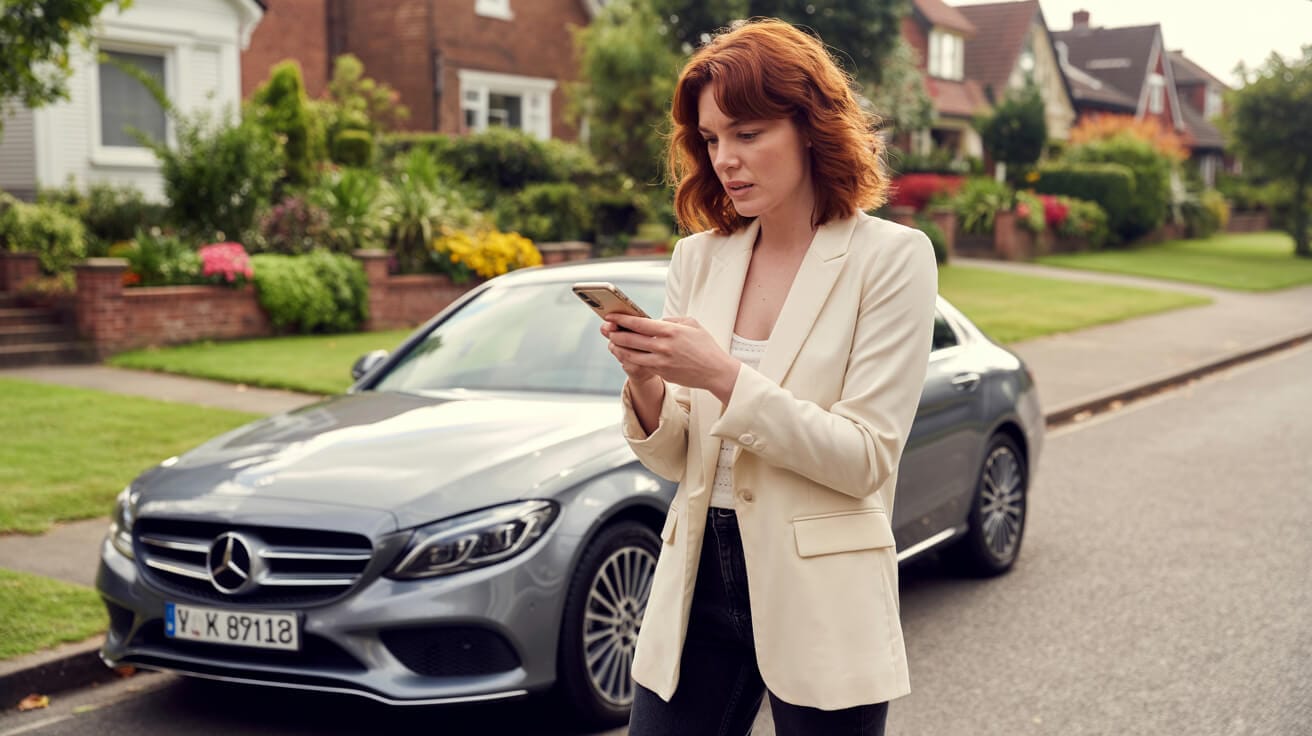
Solid maintenance habits mean reliable access. Water, dust, or knocks can kill a fob early. Regular battery swaps (typically CR2032/CR2450 every 1–2 years) prevent the hassle of sudden lockouts.
Handle your key/fob with care—avoid pressure, bending, and proximity to magnets. For digital keys (phones/apps), keep devices charged and up to date. If your key acts up—even once—check the battery and run a function test.
How do you change a smart key/fob battery in the UK?
Battery change steps, common to most UK smart keys:
- Identify correct battery—most use CR2032 or CR2450 (check your manual or label).
- Open the fob carefully (fingernail or flat tool).
- Swap battery; avoid fingerprinting contacts.
- Close the fob, check it locks/unlocks, and starts the engine.
- Dispose of batteries responsibly.
If issues persist after a change, seek guidance—next-level fixes may require a specialist.
What are early signs your key or fob needs attention?
- Response is sluggish, delayed, or inconsistent
- “No Key Detected” or similar shows on dash or cluster
- You must be much closer for the fob to work, or press harder
- Buttons stop working altogether
Sort these as soon as they appear—avoiding a last-minute emergency.
Give a little thought to your smart key, and it will quietly prevent major headaches.
What are the pros and cons of smart key and keyless entry systems?
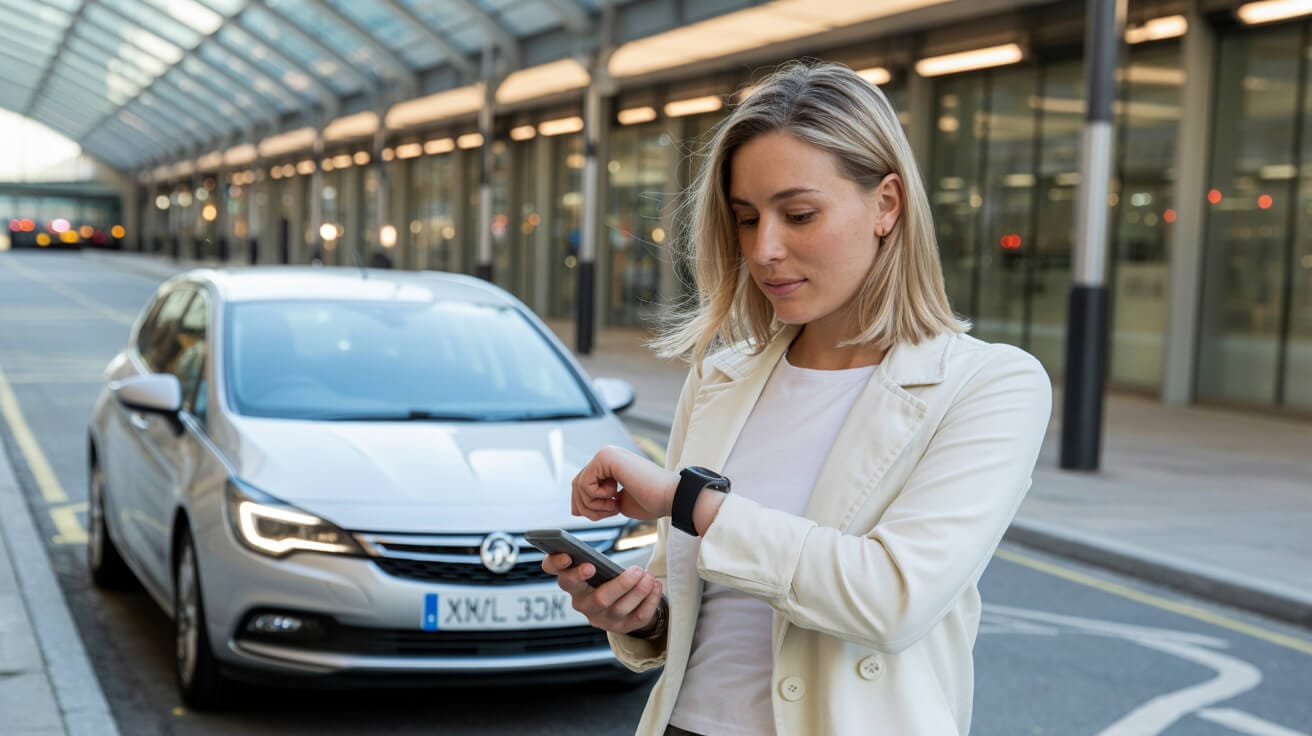
The benefits—hands-free access, fast engine start, and digital control—are real, but so are the realities: smart keys cost more to replace, require updated habits, and need you to think a step ahead on security.
Here’s a quick view to help you weigh up:
| **Pros** | **Cons** | |
|---|---|---|
| Entry | Hands-free, push-button ease | Potential relay risk |
| Features | Personalised, digital, guest-enabled | Higher cost/complex replacement |
| Security | Strong encryption; tough to pick/clone | Battery, software or app failure |
| Flexibility | Some allow remote/guest access | Dealer-only for latest digital systems |
Most UK drivers see the time saved and security as a win; those who travel with family, work equipment, or value app-controlled access get the best deal. But knowing your system’s limits—and practising best habits—protect your investment.
Is smart key tech right for you?
- Juggling kids, shopping, or work kits? Hands-free is a real plus.
- Want to share the car? Digital guest keys are practical and safe.
- Fan of the latest tech? App access and instant remote features complete the package.
- Ready to keep batteries fresh and pay a bit more for high security? You’ll appreciate the upgrade.
If so, smart keys make your car ownership easier, faster, and more secure—if you commit to using them smartly.
How do you choose an auto locksmith for smart key and keyless entry in the UK?
Pick a locksmith whose first language is compliance—ID and vehicle checks, non-destructive-first methods, and certified, audit-proof tools as a baseline. If a specialist can’t tell you how the job will be documented—from consent to handover—walk away.
Ask up front about service levels, time-to-arrival, itemised quotes, warranty, and aftercare. Any reputable locksmith should comfortably provide proof: from trained staff to secure data handling.
What makes a UK auto locksmith stand out?
- Licenced, insured, background-checked.
- Trained for the makes/services they offer—including digital/app-based keys.
- Transparent, fixed menus for pricing—no ambiguity when bills arrive.
- Emergency response—targeting 60–90 minutes for urgent callouts.
- Reliable warranty and aftercare included, not extra.
When you choose Autolocks Ltd, you know every job is documented, compliant, and transparent—from the security check to the spare fob handover.
What extra assurances are standard with Autolocks Ltd?
- All personal data encrypted and stored under UK/EU privacy law requirements.
- Non-destructive-first philosophy on callouts—no cosmetic car damage.
- Warranty on parts and programming, with aftercare always provided.
- Fast arrival promise for emergencies and all regular jobs.
- Up-to-date technical kit for programme/cut/test on-site.
When the work is ethical, clear, and consistently above board, your vehicle and peace of mind are both secure.
Choose Autolocks Ltd for Secure Smart Key Solutions
Choose Autolocks Ltd when secure access, audit-ready service, and compliance are what you value most for your car. If you put a premium on proven expertise, swift response, and total respect for your car’s security, our team is ready to provide honest advice, streamlined replacements, or programming—protecting your keys, your journey, and your confidence for the miles ahead.
Frequently Asked Questions
How do UK smart keys and keyless systems empower drivers beyond the traditional car key?
Smart keys in the UK do much more than replace the old metal key—they orchestrate seamless, touchless access and start-up across nearly every modern vehicle, adapting to your lifestyle by removing daily hassles. Instead of a simple cut blade, your fob carries encrypted algorithms, recognised instantly by the car’s network the moment you approach. Low-frequency (LF 125kHz) antennas hidden in the door handle or boot “wake” your fob on proximity, triggering an ultra-secure code exchange across secure UHF (433MHz) or BLE/NFC/UWB channels. With one motion—handle touch or button press—the car cross-checks your credentials and unlocks in less than half a second.
When it’s time to drive, a new authentication runs inside the cockpit: the car’s start authorization pathway sweeps your key’s transponder, immobiliser status, and code logs for eligibility. If everything checks out, ignition and gearshift unlock, and audit logs capture the sequence for warranty and security. This protocol runs invisibly, protecting you whether your hands are full, you’re rushing, or the weather turns ugly.
The first time your door unlocks before your hand closes on the handle, you forget what stress feels like.
Crucially, these systems are crafted for the UK’s climate, regulation, and anti-theft needs. No lockout in the rain. No more searching coat pockets at night. Each unlock event is traceable—a silent firewall against theft, backed by verified security pathways. These innovations span Fords, BMWs, Toyotas, Nissans, and luxury icons, with smartphone “digital keys” now rolling out on premium models for even greater access and app-based control.
How does the hands-free process actually work?
- Car detects your fob’s proximity using hidden antennas.
- Fob transmits a rolling, one-time encrypted code.
- Car’s modules verify the signal, checking for match and legitimacy.
- Doors unlock and start path activates if the live credential passes—all logged for compliance.
For UK drivers, it’s more than convenience—it’s a new baseline for safe, future-proof motoring, supported by Autolocks Ltd’s expertise in system upgrades, replacements, and troubleshooting.
How secure are smart keys and keyless entry systems against UK car theft, and what do insurers require?
While advanced keyless systems redefined convenience, they also changed the rules for security. The new common threat—relay attacks—lets thieves amplify your fob’s signal, tricking your car into unlocking from your front door. The UK insurance market has responded decisively; policies often demand you store fobs in signal-blocking (Faraday) pouches, or keep keys well away from doorways, sometimes requiring documented proof for theft cover. Ignore these requirements and you risk claim denial.
Car makers and locksmiths are fighting back: the latest smart keys feature sleep modes (signal shuts down when motionless overnight), motion sensors, ultra-wideband (UWB) “proximity fencing,” and rolling-code refresh that invalidates cloning. Still, owner action is vital. Most break-ins exploit the basics—fobs left live in the hallway, passive entry not disabled, firmware never updated.
Security doesn’t start at the factory—it stays alive in your habits every time you walk through your own front door.
Your protection relies on three layers:
- Tech: Updated fobs, enabled UWB or motion features; firmware recalls checked.
- Habits: Fobs always in a Faraday pouch or lockbox; avoid storing near entrances/windows; disable walk-away locks.
- Compliance: Maintain purchase receipts for Faraday products, insurance upgrades, and locksmith audit records. Insurers may request these for claims.
Autolocks Ltd stays ahead of the curve by updating customer software, demonstrating anti-relay upgrades, and logging all compliance steps as proof for insurers; our checks let you claim, not battle, if something goes wrong.
What actions maintain both your cover and your safety?
- Use a Faraday pouch for every fob, every night.
- Keep up with firmware recalls and manufacturer advisories.
- Turn off passive entry/walkaway unlock when possible.
- Document every security upgrade, and ask your insurer if new habits are now required under your policy.
What factors shape the cost to replace or programme a UK smart key, and how do you get the best value?
Smart key replacement isn’t just about buying hardware—it’s a blend of secure equipment, verified authority steps, and expert programming. For most UK vehicles, replacing a smart key costs £150–£350; digital-only (app-enabled) keys or dealer-only protocols raise that figure, especially if every key is lost.
| Service Feature | Typical Cost | Example Application |
|---|---|---|
| Standard Fob | £145–£220 | Ford, VW, Toyota, Vauxhall |
| Premium Fob/Prox | £200–£350 | BMW, Mercedes, Audi |
| Digital/App Key | £275+ (dealer) | Tesla, BMW, high-end Mercedes |
| Out-of-hours/Emerg. | +20–30% | Lockout, lost-key SOS |
Every step—fob supply, owner ID check, on-site or home visit, secure programming (including immobiliser/rolling code handshake), and full demonstration—is priced separately for clarity. Emergency or late-night service? Expect a surcharge, but also an audit trail and warranty to protect you from after-hours pitfalls.
Speed and precision cost less than the mess of a faulty unlock or dealer tow—buy peace of mind, not just a fob.
A reputable specialist like Autolocks Ltd delivers price transparency: itemised quotes, no payment before demo, and documentation ready for insurance, warranty, and compliance. Avoid lowball quotes from unlicensed operators; a few pounds saved today can mean thousands lost in a future lockout or claim dispute.
How to optimise your investment:
- Always demand an itemised quote—fob, programming, callout, and warranty separated.
- Insist on seeing the process: legal owner checks, diagnostic steps, demo of both lock/unlock/start.
- Find a provider who logs all jobs and warranties—crucial for insurers and resale.
Which car brands in the UK offer keyless entry or smart keys, and how do you compare features and security?
Keyless entry isn’t just a high-end perk anymore—it’s baked into most UK cars: Ford, VW, Toyota, Nissan, Mercedes, BMW, Vauxhall, Renault, and more. But beyond “it unlocks my car,” brand differences run deep. Feature gaps and upgrade paths depend heavily on brand, model, year, trim, and even software version.
| Brand | Smart Key | Digital/App Key | Security Enhancements |
|---|---|---|---|
| Ford | Yes | Limited | Sleep-mode fob, deadlock |
| BMW | Yes | Full (late) | UWB, PIN-to-start, recall |
| Mercedes | Yes | App-linked | UWB, PIN, motion detect |
| Toyota | Yes | Partial | Proximity lock, anti-relay |
| Nissan | Yes | Limited | Fob “sleep”, anti-jam |
For upgrading or diagnosing, model year, installed hardware, and dealer lock-in matter. App-only access (Tesla, BMW Digital Key, late Mercedes) still requires dealer compliance for new key coding or loss. However, most smart key functions—including feature upgrades—are available with specialised programming from top locksmiths.
Features your dealer says are impossible can be enabled or repaired by brand-certified locksmiths—if you know what to ask.
Start your process with your registration/VIN and a question to your specialist—they’ll check active firmware, compatibility for upgrades, and compliance with security and insurance. Autolocks Ltd’s live database matches UK makes and models to valid credentials, ensuring that the newest tech gets safely paired with your older pride and joy, or keeps your company car fleet future-ready.
How do you check what’s available on your car?
- Cross-reference your make, model, and VIN with a locksmith’s live coverage.
- Identify which options are upgradeable—retrofitting is often possible.
- Demand a transparent demo of all features at handover.
What immediate steps should you take if your UK smart key stops working or you’re locked out?
A failed smart key rarely signals deep trouble—it’s usually a dead battery, minor interference, or a stuck switch. UK owners are best served by a fast, checklist-based recovery:
- Swap the fob battery: Common coin cells (CR2032, CR2450) fix 80%+ of failures.
- Retrieve the emergency blade or card: All legitimate fobs hide one for manual unlock—slide it out.
- Move away from dense RF environments: Shopping centres, rapid EV chargers, bus stops, and building glass can disrupt signals.
- Test all doors and boot: Some cars prioritise driver access or rear doors from sleep mode.
- Hold fob at “secret” spot: Check your manual—RFID or NFC hotspots start cars when power is low.
- If you’re stuck, call Autolocks Ltd: ID and vehicle checks, non-destructive entry, new batteries or fobs on hand, and an on-the-spot demo.
The best locksmith’s van leaves you safer than you started—stocked, skilled, and ready for any model.
If calling for help, verify the provider’s credentials. Trustworthy specialists log all work (protecting your warranty and privacy) and finish only after you test every function. Dealer recovery means tows, delay, and cost; a certified locksmith restores your access and confidence within the hour on most UK streets.
Can every auto locksmith in the UK handle repair, programming, and upgrades for all smart keys and keyless cars?
Most modern UK vehicles—over 95%—are now serviceable by credentialed auto locksmiths using authorised tools, up-to-date software, and full brand coverage. Exceptions exist: fully digital keys (Tesla, latest BMW, and Mercedes app-based systems) often require cloud authentication and remain locked to dealers for security compliance.
Autolocks Ltd sets the national benchmark:
- Strict legal owner checks before every job
- Non-destructive access and programming for every major brand (Ford, BMW, Toyota, Nissan, Mercedes, VW, Renault, etc.)
- Warranty on every repair, upgrade, and key cut, with demo before payment
- Full process logs—every fob coded, every module touched, securely stored (no shortcuts, no PII risks)
- On-demand mobile response: urgent or scheduled, with fleet and dealer options
Each cut, code, or fix is tracked in an encrypted, privacy-protected log for your future claims, insurance, and resale needs.
Ask about compliance steps and data governance before booking; get proof you’re covered. The strongest specialists will supply written documentation, a transparent warranty, and visible steps that go beyond old-school “key cutting.” With Autolocks Ltd, you’re back on the road fast—trust, privacy, and compliance built into every step, from callout to lock/unlock demonstration.
When your access, security, or time matter most, count on Autolocks Ltd for fast, legal, and technically-superior smart key solutions—replacement, repair, or digital upgrades—delivered right to your kerb. Unlock peace of mind, every journey.

